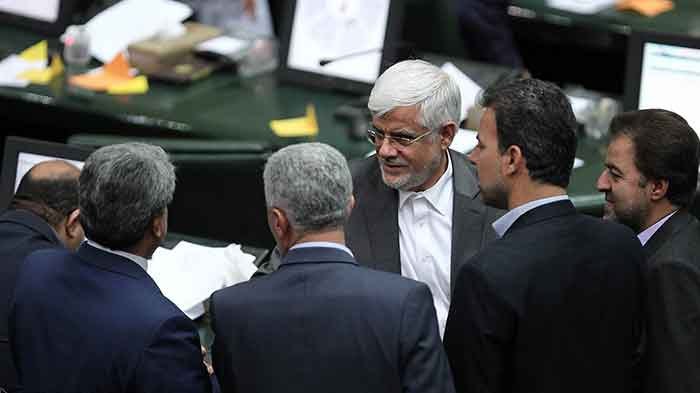Reformist MPs Urged to Keep Hope Alive

When the reformist-moderate coalition’s list of parliamentary hopefuls, dubbed the “List of Hope”, swept all the chairs available for the capital in the parliamentary election held four months ago, few would believe the Hope caucus would lose nearly all the important posts in Majlis after winning two deputy speakerships, bringing despair for voters and as it appears even for the MPs themselves.
Hope’s leading candidate Mohammadreza Aref who obtained more than 3 million votes in Tehran first aspired for the Speaker status but was outvoted by veteran Ali Larijani with a big margin of more than 70. This prompted speculations of a wide divide within the caucus who had claimed a majority, considered by many reformist analysts as an insider betrayal. Other commentators argued that the vote meant Larijani’s priority as a choice capable of cutting paths between the two main political factions and serving national interests more properly. Days later, when Aref turned down a highly anticipated offer as the chairman of the Majlis Research Center, his leadership began to decline. He refused to run for the chair of the education committee, the least expected by his reformist proponents. Other fellow reformists could not strike remarkable victories in their respective committees, too. The situation became even worse when Majlis gave its vote of confidence to the jurist members of the Guardian Council. Reformists saw adverse figures, who could not pass even in the previous principlist-dominated Majlis, endorsed.
Put together, all these obvious defeats have made even the most ardent supporters of the Hope list dismayed. Recent reports that a number of the Hope MPs have launched a bid to impeach Labor Minister Ali Rabiei came as a final blow, challenging the raison d'etre of the Hope list, namely to support the Rouhani administration.
Now, voices within the reformist camp are becoming more and more open in expressing concern. Mohammad-Ali Abtahi, a former Vice President, has openly urged Aref to be more active under a photo of Aref and Mohammad Khatemi he posted on Instagram on Monday. “This news void from the Majlis is alarming,” he wrote suggesting that Mr. Aref should work harder to consolidate the caucus, report violations of the constitution, and interpellate or impeach those ministers preoccupied with wishes against those of the people. Surprisingly, Abtahi said this last one could be the best kind of assistance for the administration. “Keep hope alive, Mr. Aref,” he added, warning that lack of spirit inside the caucus will ruin its unity.
However, Mohammadreza Tajik, a presidential advisor during the so-called reform era, believes that the conducts of Aref and the caucus should be seen separately. Commenting on what is commonly seen as Aref’s passivity, he says:
“Mr. Aref’s conduct in turning down posts other than Speakership is a fully active approach undertaken with previous consultation and there is no passivity in that. At the moment, Aref is considered a capability for reformism, a card that can be played in elections and important political showdowns to achieve victory. Thus, the capacity should not be limited in a fixed framework. We should allow him to play his role as the “spiritual father of the Majlis” and the “leader” of the Hope caucus”.
On the other hand, he believes the unintegrated Hope caucus has already damaged the reformists’ social base. “The reformists need a sort of regeneration in Majlis. We should review the role reformist MPs are to play in the Majlis and draw a new roadmap for them … they should not mistake unimportant issues with the primary ones. They should be on alert not to fall into the psychological war of their political rival. In the coming months, we will have two important elections, those of the city councils and the presidential race, where the efficiency of reformists in the Majlis can be crucial,” he told Arman daily, in an interview published on Tuesday.
Arman, the unofficial organ of former president and the sitting chairman of the expediency council Hashemi Rafsanjani, also published an interview with another reformist, Dariush Ghanbari, who believes it is too early to judge the caucus. “The caucus went into a shock and needs restructuring now but this does not mean that its dominant principle of integrity and commitment to organized work is forgotten, particularly because Mr. Aref is a high-spirited individual with firm faith in the functions of the Hope caucus and will try to realize it.”
The Rouhani administration has been under constant attacks in foreign and domestic policy. The recent pay slip scandal, believed by many to be unfairly blamed on the administration, has degraded the administration’s social base and the slow or rather intangible economic result of the JCPOA implementation has frustrated a large part of the public. Could Aref’s leadership of the Hope caucus help Rouhani to balance power and pass legislations he needs for the economic reforms the country needs to complete its comeback into the global economy? It will be too difficult when seen in the light of the latest summit held by the Hope caucus on Tuesday, which was attended by as little as 70 parliamentarians, a fourth of the Majlis. The summit voted Aref as the permanent director of the caucus.

